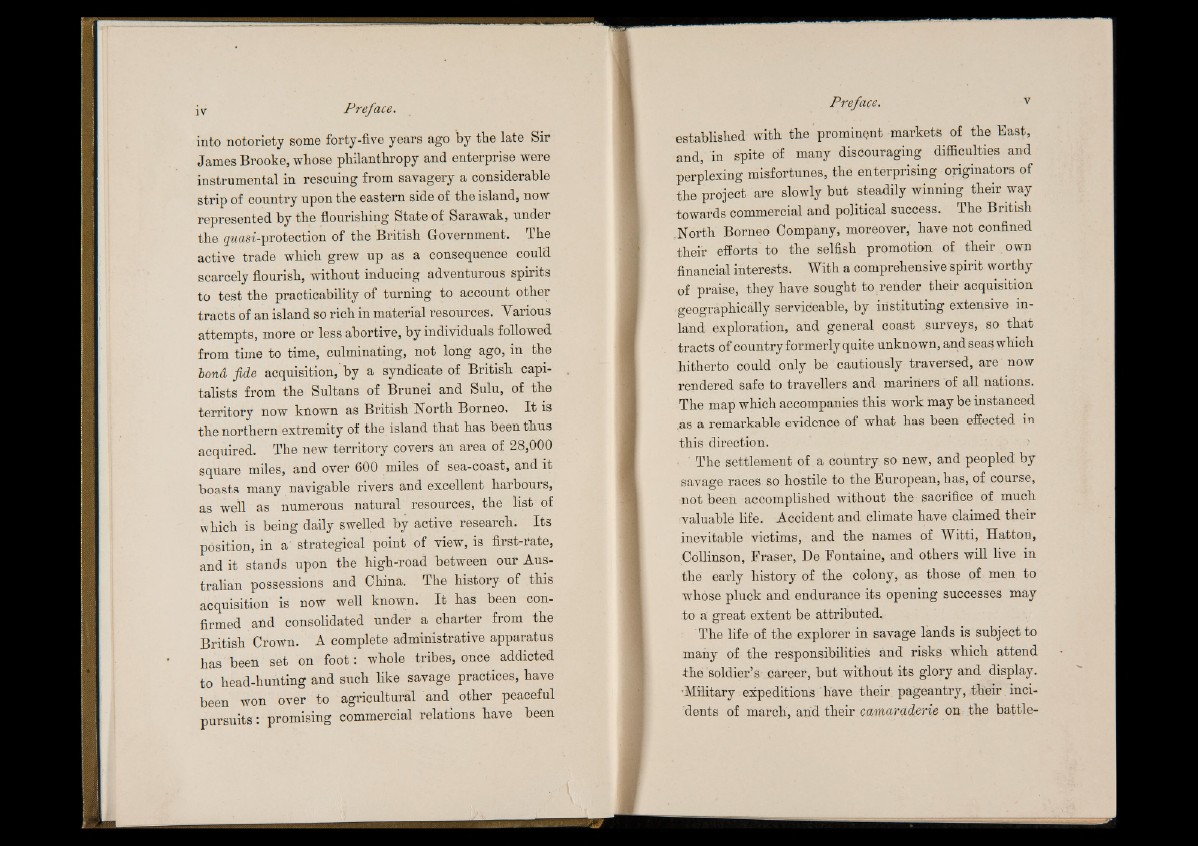
into notoriety some forty-five years ago by the late Sir
James Brooke, whose philanthropy and enterprise were
instrumental in rescuing from savagery a considerable
strip of country upon the eastern side of the island, now
represented by the flourishing State of Sarawak, under
the ^wcm-protection of the British Government. The
active trade which grew up as a consequence could
scarcely flourish, without inducing adventurous spirits
to test the practicability of turning to account other
tracts of an island so rich in material resources. Various
attempts, more or less abortive, by individuals followed
from time to time, culminating, not long ago, in the
bond fide acquisition, by a syndicate of British capitalists
from the Sultans of Brunei and Sulu, of the
territory now known as British North Borneo. I t is
the northern extremity of the island th a t has been thus
acquired. The new territory covers an area of 28,000
square miles, and over 600 miles of sea-coast, and it
boasts many navigable rivers and excellent harbours,
as well as numerous natural resources, the list of
which is being daily swelled by active research. Its
position, in a' strategical point of view, is first-rate,
and it stands upon the high-road between our Australian
possessions and China. The history of this
acquisition is now well known. I t has been confirmed
and consolidated under a charter from the
British Crown. A complete administrative appaiatus
has been set on fo o t: whole tribes, once addicted
to head-hunting and such like savage practices, have
been won over to agricultural and other peaceful
pursuits: promising commercial relations have been
established with the prominent markets of the East,
and, in spite of many discouraging difficulties and
perplexing misfortunes, the enterprising originators of
the project are slowly but steadily winning their way
towards commercial and political success. The British
.North Borneo Company, moreover, have not confined
their efforts to the selfish promotion of their own
financial interests. With a comprehensive spirit worthy
of praise, they have sought to render their acquisition
geographically serviceable, by instituting extensive inland
exploration, and general coast surveys, so that
tracts of country formerly quite unknown, and seas which
hitherto could only be : cautiously traversed, are now
rendered safe to travellers and mariners of all nations.
The map which accompanies this work may be instanced
as a remarkable evidence of what has been effected in
this direction.
The settlement of a country so new, and peopled by
savage races so hostile to the European, has, of course,
not been accomplished without the sacrifice of much
valuable life. Accident and climate have claimed their
inevitable victims, and the names of Witti, Hatton,
Collinson, Fraser, De Fontaine, and others will live in
the early history of the colony, as those of men to
whose pluck and endurance its opening successes may
to a great extent be attributed.
The life of the explorer in savage lands is subject to
many of the responsibilities and risks which attend
the soldier’s career, but without its glory and display.
•Military expeditions have their pageantry, their incidents
of march, and their camaraderie on the battle